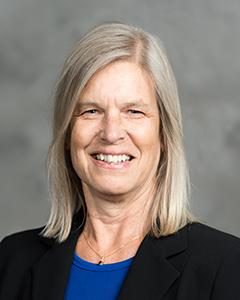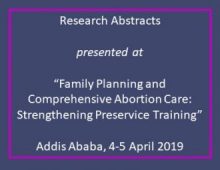CIRHT-ADDIS Conference 2019
ABSTRACT
ORAL PRESENTATION
- O-01 – Trends and Factors Associated with Long Actingand Permanent Method Contraceptive Use in Ethiopia. Gedefaw Abeje, Bahir Dar University, Ethiopia.
- O-02 – Integration of Family Planning with Abortion Services in Three Cities of Malawi: A Cluster Randomized Trial. Boniface Vincent Mbewe, Shy Ali2, Dalitso Chiwayula3, Ruth Maluwa4. Chipembere Community Development Organization, 2Umodzi Youth Organization, 3CCDO, 4Malawi Scotland Partnership (Masp).
- O-03 – Knowledge, Attitude and Practice (KAP) of Health Providers towards Safe Abortion Provision in Addis Ababa Health Centers. Endalkachew Mekonnen, Addis Ababa University, Ethiopia.
- O-04 – Determinants and Outcome of Safe Second Trimester Medical Abortion at Jimma University Medical Center, South West Ethiopia. Ahadu Workneh, Yibeltal Siraneh. Jimma University, Ethiopia.
- O-05 – Respectful Family Planning Service Provision in Sidama Zone, Southern Region, Ethiopia, 2018. Melese Siyoum, Ayalew Astatkie, Teshome Melese, Zelalem Tenaw, Abebaw Abeje, Lee Roosevelt2, Hawassa University, 2University of Michigan
- O-06 – Factors Affecting Women Experiencing Abortion in Rural Communities in Malawi. Ephraim Chimwaza, Hannifa Makwinja, Lovemore Amin, Benson Chikoja. Centre for Social Concern and Development.
- O-07 – Discontinuation of Modern Contraceptive Use and Associated Factors among Reproductive Age Women in Rural Machakel District, East Gojjam Zone, Northwest Ethiopia. Tebikew Yeneabat, Shitalem Tesfaw2, Habtamu Abera3. Debre Markos University, 2Debre Markos Referral Hospital, 3University of Adelaide.
- O-08 – Knowledge and Attitude towards Induced Abortion among Medical Interns of Addis Ababa University, Ethiopia. Kalkidan Belayneh, Dawit Kassa2. Jamma P. Hospital, 2Addis Ababa University.
- O-09 – Intra-amniotic Digoxin Administration to Induce Fetal Demise Prior to Late Second Trimester Abortion as a First Experience in a Tertiary Health Facility in Addis Ababa, Ethiopia. Tesfaye Tufa, Lemi Belay Tolu, Jason Bell2, Lauren Macafee2, Vanessa Dalton2, Chava Kahn2, Feiruz Surur, Berhanu Seboka. Saint Paul’s Hospital Millennium Medical College (SPHMMC), 2University of Michigan
- O-10 – Modern Contraceptive Use among 15-34 Sexually Active Unmarried Young Females in Rwanda: Secondary Data Analysis of 2014-15 Rwanda Demographic and Health Survey. Jean Pierre Nganabashaka, Albert Ndagijimana, Laetitia Nyirazinyoye, University of Rwanda.
- O-11 – Determinants of Intention to Use Family Planning Methods in the Four Emerging Regions of Ethiopia: Ideation Score Based Assessment. Tewodros Getinet Yirtaw, Delayehu Bekele, Alula Meressa, Feiruz Surur, Balikachew Nigatu, Tadele Kebede Lako, Berhane Assefa Merddassa, Tenaye Kebede Adamo2. Saint Paul’s Hospital Millennium Medical College, 2Federal Ministry of Health, Ethiopia.
- O-12 – Unsafe Abortion and Associated Factors Among Women in Child Bearing Age Attending Maternal and Child Health Care of Public and Private Unit Health Facilities, in Jigjiga City Council Administration Somali Region, Ethiopia in 2018. Wubareg Seifu, Abdiwahib Hashi, Abdi Barkhadle. Jigjiga University.
- O-13 – Focused Family Planning Counseling Increases Immediate Postpartum IUCD Uptake: A Quasi Experimental Study. Muleta Wayessa. Adama Hospital Medical College.
- O-14 – Return of Menstruation and Perceived Risk of Pregnancy among Exclusive Breastfeeding Women in South West Nigeria: Implications for Timely Introduction of Active Contraception. Ernest Orji, Kolade Afolayan Afolabi2, Adebukunola Olajumoke Afolabi3, Titilayo Ayotunde4. Department of Obstetrics and Gynaecology, 2Obafemi Awolowo University, Ile-Ife, 3Medical and Health Services, Obafemi Awolowo University, Ile-Ife, 3Clinical Nursing Services, Obafemi Awolowo University Teaching Hospitals Complex, Ile-Ife., 4Demography and Social Statistics, Obafemi Awolowo University, Ile-Ife.
- O-15 – The Magnitude and Determinants of Repeat Induced Abortion among Reproductive Age Women Seeking Abortion Care Services at Health Institutions in Debre Markos Town, Amhara Regional State, Ethiopia, 2017: Cross Sectional Study Design. Tewodros Seyoum, Mahalet Imana2. University of Gondar. 2Mizan Tepi University.
- O-16 – Modern contraceptive use Among Partnered (Sero-Concordant) ART Service Users in Selected Public Health Centers of Addis Ababa, Ethiopia. Abiy Regassa, Sante Medical College of Health Sciences.
- P01 – Improved Continuity of Post-natal Care and Family Planning Use through Educating Midwifery/Family Nurse Practitioners. Ruth Zielinski, University of Michigan.
- P02 – Midwifery Helpline (MHL). Abdul Malik Faize, Zelaikha Anwari, Bannet Ndyanabangi2. MOPH, 2UNFPA.
- P04 – Improving the Quality of Family Planning Services Using the 72-hour Clinic Makeover Approach. Experience from Four States in Nigeria. Lekan Ajijola, Deborah Samaila, Tobi Komolafe, Chidinma Owanlan, Mukhtar Muhammad, Yakubu Abubakar, Jumoke Adekogba, Oluwayemisi Ishola. Johns Hopkins University Centre for Communication Programs.
- P05 – Whole Site Orientation: An Approach to Improving Quality and Access to Family Planning Services in 5 Northern States of Nigeria. Deborah Samaila, Lekan Ajijola2, Mukhtar Muhammad, Yakubu Abubakar, Olusola Solanke, Grace Ifenne, Muknaan David Nshe. Johns Hopkins University Centre for Communication Programs, 2The Challenge Initiative – Nigeria.
- P06 – The Role of Technology in Increasing Access to Family Planning Information and Knowledge: Lessons from TCI University. Nneoma Anieto, Lekan Ajijola2, Victor Igharo2, Kaseina Dashe. Johns Hopkins University Centre for Communication Programs, 2The Challenge Initiative – Nigeria.
- P07 – Does Integrated State Family Planning Work-plan Contribute to Efficiencies in Budgeting and Implementation of Family Planning Programs? Experience from Ten States Implementing The Challenge Initiative Program in Nigeria. Lekan Ajijola, Victor Igharo, Olukunle Omotoso, Deborah Samaila, Oluwadamilola Opawale, Nneoma Anieto, Oluwayemisi Ishola, Olumide Adefioye. Johns Hopkins University Centre for Communication Programs.
- P08 – Funding for Family Planning Programs in Nigeria; The Challenge Initiative’s Model of Catalyzing Government Domestic Funding and Resource Leveraging from Implementing Partners. Lekan Ajijola, Victor Igharo, Dorcas Akila, Priscilla Usiobaifo, Mbuotidem Brendan, Kaseina Dashe. Johns Hopkins University Centre for Communication Programs.
- P09 – Identifying Influencers of Adolescent and Youth Reproductive Health Information and Services in Niger State, Nigeria: A Netmapping Exercise. Priscilla Usiobaifo, Kabir Abdullahi, Victor Igharo. The Challenge Initiative – Nigeria.
- P10 – Support or Not to Support: Parents’ Dilemma on Abortion Services for Daughters in the Tamale South Constituency of Northern Ghana. Aminu Danaa Issah, Mohammed Awal Alhassan. NORSAAC.
- P11 – Uptake of Family Planning Methods amongst Women Living with HIV in Obio Cottage Hospital, Rivers State, Nigeria. Boma Levy-Braide, Mukhtar Ijaiya2, Fajola Akinwumi3, Chidozie Umejiego4, Aderonke Ojeniyi4, Imaofon Essien Udoh, Edidiong Etim5, Titilope Baduru6, Chinedu Agbarakwuru, Mariya Saleh, Edward Oladele, Oluwasanmi Adedokin, Hadiza Khamofu, Satish Pandey. FHI360, 2Devtech Systems, 3SPDC, 4Obio Cottage Hospital, 5Clinton Health Access Initiative, 6FHI.
- P12 – Social Media Usage and Predictors of Risky Sexual Behavior among Pre-College Students in Adama Town, Ethiopia. Geremew Wana, Abraham Kebede. College of Medicine, University of Ibadan, Ibadan.
- P13 – Contraceptive Use among HIV-Positive and Negative Women: Implication to End Unintended Pregnancy. Amanual Getnet Mersha. University of Gondar.
- P14 – Community Outreach to Tackle Unmet Need in Family Planning and Reproductive Health in Rwanda. Case Study: “World Contraception Week, September 2018”. Diomede Ntasumbumuyange, Alice Mwiza, Magnifique Irakoze3, Gerard Kaberuka2, Aimable Nkurunziza24/sup>, Madeleine Mukeshimana, Stephen Rulisa. University of Rwanda, 2ERC, 3CMHS, 4SONM.
- P15 – A Comparative Study of Patterns of Sexual Behavior among Adolescents from Rural and Urban Schools in Rwanda. Blaise Munyakarama, Aimable Nkurunziza2, Madeleine Mukeshimana, Diomede Ntasumbumuyange, Alice Mwiza2, Olive Tengera, Magnifique Irakoze4, Gerard Kaberuka3, Stephen Rulisa. University of Rwanda, 2SONM, 3ERC, 4CMHS.
- P16 – Family Planning Needs Assessment in Selected Rwandan Communities. Stephen Rulisa, Aimable Nkurunziza2, Madeleine Mukeshimana, Diomede Ntasumbu-muyange, Alice Mwiza3, Olive Tengera, Blaise Munyakarama, Magnifique Irakoze4, Gerard Kaberuka3. University of Rwanda, 2SONM, 3ERC, 4CMHS.
- P17 – Sexual and Reproductive Risk Taking Behaviours among In-School Adolescents in Kigali, Rwanda. Aimable Nkurunziza, Madeleine Mukeshimana2, Omolola Irinoye2, Diomede Ntasumbumuyange2, Alice Mwiza3, Olive Tengera2, Blaise Munyakarama2, Magnifique Irakoze4, Gerard Kaberuka, Stephen Rulisa. SONM, 2University of Rwanda, 3ERC, 4CMHS.
- P18 – Assessment of quality of Comprehensive Abortion Care Services at Kigali University Teaching Hospital. Delphine Umugwizawase, Seraphine Nyiraneza, Helene Mucyo, Kenneth Ruzindana2, Diomede Ntasumbumuyange2. Kigali University Teaching Hospital, 2University of Rwanda.
- P19 – Lack of Effective Counseling: A Barrier in Family Planning Use and Its Continuity Among Rural Women in Rwanda. Madeleine Mukeshimana, Aimable Nkurunziza, Jean Bosco Henri Hitayezu, Tamrat Endale2. University of Rwanda, 2University of Michigan.
- P20 – Factors Influencing Tubal Ligation Acceptance in Rwanda. Adolphe Karegeya Byambu, Stephen Rulisa, Diomede Ntasumbumuyange, Maria Small2, Kenneth Ruzindana, Gashema Heritier. University of Rwanda, 2Duke University.
- P21 – Youth Champions Who Are Real Actors in the Fight Against the Stigma of Abortion. Agossa Aholou Genevieve. Member Association of Benin (ABPF).
- P22 – Contraceptive Use and Associated Factors among High School Adolescent Students in Jimma Town: A Cross-sectional Study. Yesuf Ahmed, Habib Mohammed, Habtamu Jarso. Jimma University.
- P23 – Assessment of Use of Long-Acting Reversible Contraceptive and Associated Factors among Women of Reproductive Age in Dire Dawa City Administration, Eastern Ethiopia. Abdurezak Umer. Diredawa University.
- P24 – Determinants of Access and Attitude of Family Planning among Reproductive Age Women in Dire Dawa City Administration, Eastern Ethiopia. Abdurezak Umer, Mohammed Yuya2, Ahmednur Mohammed. Diredawa University, 2Jigjiga University.
- P25 – Unplanned Pregnancy and Perinatal Depression: A Meta-analysis. Amanuel Abajobir. DMU/UQ.
- P26 – Prevalence of Dual Contraceptive Use among HIV Positive Women at the University of Gondar Hospital, Northwest Ethiopia. Mebratu Mitiku Reta, Gizachew Assefa Tessema, Getachew Shiferaw. University of Gondar
- P27 – Barriers to Reproductive Health Services for Adolescents and Women with Disabilities in Addis Ababa. Susan Ernst, Claire Kalpakjian, Liya Solomon2, Lia Tadesse Gebremedhin3, Jodi Kreschmer. University of Michigan, 2Ethiopian Center for Disability and Development, 3State Minister of Health.
- P28 – Barriers to Provision of Reproductive Healthcare for Adolescents and Women with Disabilities in Addis Ababa. Susan Ernst, Claire Kalpakjian, Feiruz Surur2, Nebiyou Wendwessen3, Lia Tadesse Gebremedhin4, Jodi Kreschmer. University of Michigan, 2Saint Paul’s Hospital Millennium Medical College, 3Institute for Healthcare Improvement, 4Ethiopian Federal Ministry of Health.
- P29 – Developing a Community-based Innovation for Primary Health Care and Family Planning Services in Gusheigu, Northern Ghana. Dennis Chirawurah. University for Development Studies.
- P30 – Revisiting Community Engagement for Family Planning Services Innovation in Northern Region of Ghana. Dennis Chirawurah. University for Development Studies
- P31 – The Role of Peer Educators in FP Uptake by Young People, SNNP, Ethiopia. Masresha Soressa, Worknesh Kereta, Getaneh Assefa. Pathfinder International.
- P32 – Effect of Scaling Up Family Planning on Maternal Survival in Ethiopia: Spectrum Modeling. Abebaw Kasahun, Haimanot Adane. Wolkite University.
- P33 – Factors Determining the Choice of Modern Contraceptive Methods among Women in Kigali City: A Case Study of Muhima Districts Hospital and Gitega Health Center. Nsenga Bakinahe. University of Rwanda.
- P34 – Access to Comprehensive Abortion Care Services for Adolescents and Young Women in Uganda; Barriers and Opportunities. Kadokech Sebs. Naguru Teenage Information and Health Center.
- P35 – The Effect of Increased Knowledge of Contraception Options and the Utilization of Long Term Re-versible Contraceptives on Pregnancy Rates among HIV-positive Women in Cameroon. Elyssa Metas, Pooja Doehrman, Chloe Wood, Katerina Zappas, Enow-Orock George Enownchong, Enow-Orock Ayuketah2. Creighton University School Medicine – Phoenix OBGYN Residency, 2University of Buea.
- P36 – Levels and Determinants of Long Acting Contraceptive Methods Utilization among Reproductive Age Women in Debre Markos Town, Ethiopia. Bekalu Kassie, Fisseha Yetwale2, Kahsay Gebreslasie3, Zerfu Mulaw2, Yibeltal Aschale. Debre Markos University, 2University of Gondar, 3Mekelle University.
- P37 – Knowledge and Utilization of Adolescent and Youth Sexual and Reproductive Health Services in Hawassa University Students, Hawassa, South Ethiopia. Abdella Abdo, Abraham Alano, Dejene Hailu2. Hawassa University, 2Southern Nation Nationalities and Peoples Region, Regional Health Bureau.
- P38 – Family Planning Service Satisfaction and Associated Factors in Southeast Health Facilities of Tigray Region, Ethiopia, 2018. Kahsay Gebreslasie, Gelawdiwos Gebre, Solomon Weldemariam, Gebretsadik Gebremedhin, Abdella Abdo2, Habtom Tadesse. Mekelle University, 2Hawassa University.
- P40 – Determinants and Practice of Family Planning among Women of Reproductive Age in Debre Markos Town, Amhara, Ethiopia. Beza Dagnaw. Debre Markos University.
- P41 – Dual Contraceptive Utilization and Associated Factors among Women Living with HIV Attending ART Clinics in West Zone Health Facilities, Oromia, Ethiopia. Dereje Demissie, Tolera Gudisa. Ambo University.
- P42 – Knowledge, Attitude and Practice towards Family Planning among Reproductive Age Women in North Achefer District, Amhara Region, Northwest Ethiopia, 2017. Ayele Semachew. Bahir Dar University.
- P43 – Postabortion Contraception: A Systematic Literature Review on a Critical Intervention for Maternal and Reproductive Health. Mallory Michalak. University of North Carolina.
- P44 – Applying the Concept and Measurements of Respectful Maternity Care in Family Planning and Abortion Care Settings: Evidence from a Specialized Teaching Hospital in Ethiopia. Anteneh Asefa, Mengistu Hailemariam2, Munir Kassa2, Mengistu Gebremichael3. Hawassa University, University of Melbourne, 2Center for International Reproductive Health Training (CIRHT), 3Mekelle University.
- P46 – Prioritizing of Domestic Funding over Donor Reliance for Scale Up of Family Planning. Esther Ndinya. Network for Adolescent and Youths of Africa (NAYA Kenya).
- P47 – Involving Policymakers in Advocacy as a Way of Ensuring Allocation to Family Planning: Kisumu County, Kenya. Olivia Otieno, Faith Abala. Network for Adolescent and Youths of Africa (NAYA Kenya).
- P48 – Assimilation of Contraception into Universal Health Coverage. Nelson Onyimbi. Network for Adolescent and Youths of Africa (NAYA Kenya).
- P49 – Role of Young People in Ensuring Social Accountability: Kisumu County, Kenya. Faith Abala, Olivia Otieno. Network for Adolescent and Youths of Africa (NAYA Kenya).
- P50 – The Law and Comprehensive Abortion Care Services in Kenya. Michael Oliech. Network for Adolescent and Youths of Africa (NAYA Kenya).
- P51 – Outcomes of Second Trimester Surgical Abortion: The Experience of a Tertiary Health Facility in Ethiopia. Tesfaye Tufa, Megan Yanik2, Mekitie Wondafrash, Jason Bell2, Chava Kahn2, Lauren Macafee2, Vanessa Dalton2, Feiruz Surur. Saint Paul’s Hospital Millennium Medical College (SPHMMC), 2University of Michigan.
- P53 – Knowledge and Practice towards Modern Contraception among First Year Female Students in University of Rwanda College of Business and Economics, Gikondo Campus. Alice Muhayimana, Emmanuel Ndayambaje. University of Rwanda.
- P54 – Acceptance of Intrauterine Contraceptive Device and Associated Factors among Family Planning Users at Metehara Health Center, East Shoa Zone, Oromia Region, Ethiopia. Elias Wakwoya. Haramaya University.
- P55 – Assessing Client’s Preference: Medical versus Surgical Abortion in Jimma Model Clinic, Southwest Area Office, Ethiopia, 2017. Ketema Lema, Dassalegn Workineh. Family Guidance Association of Ethiopia/IPPF.
- P56 – Consistent and Correct Condom Utilization as a Family Planning Purpose and Associated Factors among Sexually Active Female Anti-retro Viral Treatment Users in Finoteselam District Hospital, North West Ethiopia, 2016. Getie Aynalem, Kiber Temesgen, Miteku Limenih, Marta Berta, Abayneh Akililu. University of Gondar.
- P58 – IN THEIR HANDS Project Presentation Kenya. Bruce Njuguna. Family Health Options Kenya.
- P59 – Level of Utilization and Associated Factors of Reproductive, Maternal and Neonatal Health Services among Women from Pastoralist Communities of Afar Region, Northern Ethiopia. Mussie Alemayehu, Afework Mulugeta, Araya Medhanyie, Kibrom Brhanu, Yemane Gebremariam, Selemawit Asfaw. Mekelle University.
- P60 – Perceived Male Involvement of Family Planning Improved Intention to Use among Women of Pastoralist Communities in Ethiopia: Ordinal Logistic Regression Analysis. Mussie Alemayehu, Araya Medhanyie, Afework Mulugeta. Mekelle University.
- P61 – Advocating for Increase of Finances in the Health Sector for More Contraceptives: A Case of Youth Advisory Council Mombasa County. Juliet Akumu. Youth Advisory Council.
- P62 – Counseling Strategy and Uptake of Post Abortion Long Acting Contraceptives Methods in Low Resource Setting Facilities in Kenya. Caroline Nyandat, Monica Oguttu. KMET.
- P63 – Utilization of Long Acting Reversible Contraceptive Methods and Associated Factor among Women who Came for Family Planning Service in Bahir Dar City Public Health Facility, Northwest Ethiopia: Institutional Based Cross Sectional Study. Asteray Ayenew, Amlaku Awoke. Bahir Dar University.
- P64 – Emergency Contraception: Knowledge and Practice among Female Students in Dilla University, Southern Ethiopia, 2017. Abebe Alemu, Gedefa Amanu, Daniel Kebede. Wachamo University, 2Dilla University.
- P65 – Advancing Adolescents Family Planning through Values Clarification. Dismas Damian. Marie Stopes Tanzania.
4 April 2019
| 7:00-8:00 | Registration |
|---|---|
| 8:00-8:30 |
|
| 9:00-9:30 | |
| 9:30-10:30 |
Oral Abstract PresentationsModerators:
|
| 10:30-11:00 | Coffee Break |
| 11:00-12:00 |
|
| 12:00-1:00 | Lunch Break (Lunch provided) |
| 1:00-2:00 |
|
| 2:00-3:00 |
Oral Abstract PresentationsModerators:
|
| 3:00-4:00 | Poster sessions – Harar Grill |
| 4:00-5:00 | Concurrent Workshop Session
|
| 5:00-6:00 | Welcome Reception |
5 April 2019
8:00-9:00- Plenary: Dr. Eddie Mhlanga , Global Doctors for Choice. “Contraception and Induced Abortion: Same Coin?”, Video.
| 7:00-8:00 | Socializing |
|---|---|
| 09:00-10:00 |
Oral Abstract PresentationsModerators:
|
| 10:00-11:00 |
Poster sessions – Harar Grill |
| 11:00-12:00 |
|
| 12:00-1:00 | Lunch (Lunch provided) |
| 1:00-2:00 |
|
| 2:00-3:00 |
Oral Abstract PresentationsModerators:
|
| 3:00-3:30 | Coffee Break |
| 3:30-4:30 |
Concurrent Workshops:
|
| 4:30-5:00 | Awards and Closing |
PLENARY SPEAKERS
- Dr. Lisa Harris, University of Michigan, Michigan Medicine
- Dr. Timothy R.B. Johnson, University of Michigan, Michigan Medicine
- Dr. Jody Lori, University of Michigan, School of Nursing
- Dr. Eddie Mhlanga, Global Doctors for Choice
- Dr. Willie J. Parker, West Alabama Women’s Center
- Dr. Iqbal Shah, Harvard T.H. Chan School of Public Health
 Dr. Lisa Harris is an obstetrician-gynecologist and Associate Chair of Obstetrics and Gynecology at University of Michigan’s Michigan Medicine. She has been in practice for more than 20 years, and has directed Michigan Medicine’s Fellowship in Family Planning since its inception in 2005.
In her research Dr. Harris examines issues at the intersection of clinical obstetrical and gynecological care and law, policy, politics, ethics, history, and sociology. She has focused in particular on abortion stigma, patient-centered miscarriage management, long-acting reversible contraception, and racial, ethnic and socioeconomic disparities in access to infertility care and in vitro fertilization (IVF).
Dr. Lisa Harris is an obstetrician-gynecologist and Associate Chair of Obstetrics and Gynecology at University of Michigan’s Michigan Medicine. She has been in practice for more than 20 years, and has directed Michigan Medicine’s Fellowship in Family Planning since its inception in 2005.
In her research Dr. Harris examines issues at the intersection of clinical obstetrical and gynecological care and law, policy, politics, ethics, history, and sociology. She has focused in particular on abortion stigma, patient-centered miscarriage management, long-acting reversible contraception, and racial, ethnic and socioeconomic disparities in access to infertility care and in vitro fertilization (IVF).  Timothy R.B. Johnson, M.D. served as Chair of Obstetrics and Gynecology and the Bates Professor of Diseases of Women and Children at the University of Michigan from 1993-2017. He remains an Arthur F. Thurnau Professor; Professor, Obstetrics and Gynecology; Professor, Women’s Studies, and Research Professor, Center for Human Growth and Development. His education and training have been at the University of Michigan, University of Virginia and Johns Hopkins. He is author of over three hundred articles, chapters and books and has served on numerous editorial boards, study sections, professional committees, societies and boards.
Dr. Johnson has received the Distinguished Service Award (ACOG), the Distinguished Merit Award (FIGO), the Allan Rosenfield award for lifetime achievement in Family Planning from the Society for Family Planning, and he is an elected member of the (US) National Academy of Medicine. His honorary fellowships include FWACS, FICS, FRCOG and FGCS. His research interests are fetal behavior and assessment, principles of prenatal care, global health ethics and international academic capacity building.
Timothy R.B. Johnson, M.D. served as Chair of Obstetrics and Gynecology and the Bates Professor of Diseases of Women and Children at the University of Michigan from 1993-2017. He remains an Arthur F. Thurnau Professor; Professor, Obstetrics and Gynecology; Professor, Women’s Studies, and Research Professor, Center for Human Growth and Development. His education and training have been at the University of Michigan, University of Virginia and Johns Hopkins. He is author of over three hundred articles, chapters and books and has served on numerous editorial boards, study sections, professional committees, societies and boards.
Dr. Johnson has received the Distinguished Service Award (ACOG), the Distinguished Merit Award (FIGO), the Allan Rosenfield award for lifetime achievement in Family Planning from the Society for Family Planning, and he is an elected member of the (US) National Academy of Medicine. His honorary fellowships include FWACS, FICS, FRCOG and FGCS. His research interests are fetal behavior and assessment, principles of prenatal care, global health ethics and international academic capacity building.  Dr. Jody Lori is Associate Dean for Global Affairs and a professor in the Department of Health Behavior and Biological Sciences at the University of Michigan School of Nursing. Dr. Lori’s program of research contributes to the design and testing of innovative models of care to improve maternal and newborn health in areas of the world challenged by a lack of human resources, long distances to care, and cultural, gender, and socio-economic barriers.
The key policy issues driving her research are the 300,000 maternal deaths, 2.6 million stillbirths, and 2.8 million neonatal deaths that occur each year worldwide – with the vast majority occurring in low resource countries. She has extensive field work experience in Ghana, Guatemala, Ethiopia, Liberia, Mexico, and Zambia.
Dr. Jody Lori is Associate Dean for Global Affairs and a professor in the Department of Health Behavior and Biological Sciences at the University of Michigan School of Nursing. Dr. Lori’s program of research contributes to the design and testing of innovative models of care to improve maternal and newborn health in areas of the world challenged by a lack of human resources, long distances to care, and cultural, gender, and socio-economic barriers.
The key policy issues driving her research are the 300,000 maternal deaths, 2.6 million stillbirths, and 2.8 million neonatal deaths that occur each year worldwide – with the vast majority occurring in low resource countries. She has extensive field work experience in Ghana, Guatemala, Ethiopia, Liberia, Mexico, and Zambia.  Dr. Eddie Mhlanga is a member of the South African National Committee on the Confidential Enquiry of Maternal Death. He also serves on the FIGO (International Federation of Gynecology and Obstetrics) Task Team on the Prevention of Unsafe Abortion. As director of Maternal, Child and Women’s Health for the Department of Health, Dr. Mhlanga was instrumental in helping implement the Choice on Termination of Pregnancy Act (1996).
Dr. Mhlanga has never stopped being an abortion provider. He is currently the Provincial Specialist of Obstetrics and Gynecology, Department of Health for Mpumalanga province and is providing clinical care in a low resource setting.
Dr. Eddie Mhlanga is a member of the South African National Committee on the Confidential Enquiry of Maternal Death. He also serves on the FIGO (International Federation of Gynecology and Obstetrics) Task Team on the Prevention of Unsafe Abortion. As director of Maternal, Child and Women’s Health for the Department of Health, Dr. Mhlanga was instrumental in helping implement the Choice on Termination of Pregnancy Act (1996).
Dr. Mhlanga has never stopped being an abortion provider. He is currently the Provincial Specialist of Obstetrics and Gynecology, Department of Health for Mpumalanga province and is providing clinical care in a low resource setting.  Willie J. Parker, MD, MPH, MSc, is a reproductive justice advocate who travels as an abortion provider in Alabama and Georgia. His most recent work has focused on violence against women, sexual assault, and reproductive rights and justice through advocacy and provision of contraceptive and abortion services. Most notably Dr. Parker is a recipient of the 2013 Physicians for Reproductive Health Dr. George Tiller Provider Award, the 2015 Helen Rodriguez-Trias Social Justice Award and the 2016 Dr. Felicia Stewart Advocacy Award from the American Public Health Association, and the 2016 Dr. David Gunn Lifetime Achievement Award from the Abortion Care Network.
Dr. Parker was also recently honored by the United Nations Office of Human Rights as one of 12 Women’s Human Rights Defenders on the occasion of the 20th anniversary of the United Nations’ Fourth World Conference on Women. He is also a recipient of Planned Parenthood’s 2015 Margaret Sanger Award. Dr. Parker is a 2007-2008 Leadership Training Initiative Fellow. He joined the Physicians for Reproductive Health board in November 2007.
Parker holds a BA from Berea College in Kentucky, an MD from the University of Iowa, a Masters of Public Health from the Harvard School of Public Health, and a Master of Science from the University of Michigan. He completed residencies in obstetrics and gynecology at the University of Cincinnati and preventive medicine at the University of California, San Francisco, and was an Epidemic Intelligence Service Officer with the Centers for Disease Control. Dr. Parker served as assistant professor of obstetrics and gynecology in the John A. Burns School of Medicine at the University of Hawaii prior to completing a fellowship in Family Planning at the University of Michigan in 2008. He is both board certified in obstetrics and gynecology and trained in preventive medicine.
Dr. Parker is the author of the book, “Life’s Work: A Morale Argument for Choice”.
Willie J. Parker, MD, MPH, MSc, is a reproductive justice advocate who travels as an abortion provider in Alabama and Georgia. His most recent work has focused on violence against women, sexual assault, and reproductive rights and justice through advocacy and provision of contraceptive and abortion services. Most notably Dr. Parker is a recipient of the 2013 Physicians for Reproductive Health Dr. George Tiller Provider Award, the 2015 Helen Rodriguez-Trias Social Justice Award and the 2016 Dr. Felicia Stewart Advocacy Award from the American Public Health Association, and the 2016 Dr. David Gunn Lifetime Achievement Award from the Abortion Care Network.
Dr. Parker was also recently honored by the United Nations Office of Human Rights as one of 12 Women’s Human Rights Defenders on the occasion of the 20th anniversary of the United Nations’ Fourth World Conference on Women. He is also a recipient of Planned Parenthood’s 2015 Margaret Sanger Award. Dr. Parker is a 2007-2008 Leadership Training Initiative Fellow. He joined the Physicians for Reproductive Health board in November 2007.
Parker holds a BA from Berea College in Kentucky, an MD from the University of Iowa, a Masters of Public Health from the Harvard School of Public Health, and a Master of Science from the University of Michigan. He completed residencies in obstetrics and gynecology at the University of Cincinnati and preventive medicine at the University of California, San Francisco, and was an Epidemic Intelligence Service Officer with the Centers for Disease Control. Dr. Parker served as assistant professor of obstetrics and gynecology in the John A. Burns School of Medicine at the University of Hawaii prior to completing a fellowship in Family Planning at the University of Michigan in 2008. He is both board certified in obstetrics and gynecology and trained in preventive medicine.
Dr. Parker is the author of the book, “Life’s Work: A Morale Argument for Choice”. 

